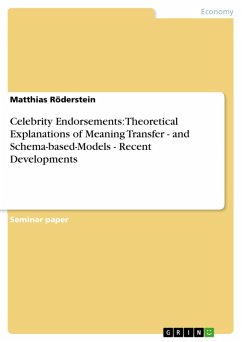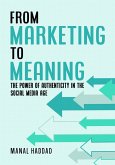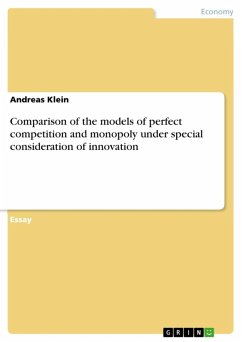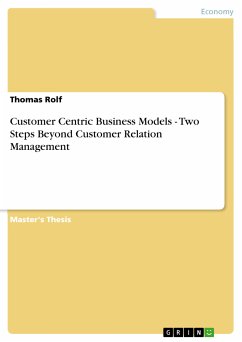Seminar paper from the year 2005 in the subject Business economics - Offline Marketing and Online Marketing, grade: 1,3, Technical University of Chemnitz, course: Seminar, language: English, abstract: Michael Jordan, Tiger Woods, Heidi Klum, Günther Jauch, Thomas Gottschalk, they have all something in common. They are famous due to their public appearance and achievements in sport, television, magazines etc. Additionally, all of them are promoting or endorsing prod-ucts. The use of famous spokesperson or celebrities in marketing communications in the United States is growing since the late 1970's and has reached a percentage of nearly 25% at the end of the 1990's. Statistics for the german market also suggest an increased use of fa-mous testimonials, although their percentage relative to other communication strategies is seen as lower. Some researchers contend a positive economic effect of celebrity endorse-ments despite they are very expensive. Noticing that endorsement contracts with celebrities are expensive raises several questions. What makes them so interesting for companies? Why are marketeers using celebrities instead of "normal" people? For executive directors it may be useful to know how the "right" celebrity could be selected from the big crowd of popular per-sons. Furthermore, which are the factors predicting wether a celebrity is effective or not as an endorser? From a more scientific point of view, it is interesting to shed light to the processes through which consumers perceive advertisements with celebrities. As the title of this study suggests, these questions are answered in a somehow theoretical way, but with some practical conclusions. Chapter 2 explains to which extent the celebrity may be part of the communication process and which effectiveness criteria exist. Having defined and classified the main concepts of this paper in chapter 2, which are celebrity endorsement and schemas, some models that are related to celebrity endorsements are explained. Research of celebrity endorsement has focused mainly on four different approaches. First, the characteris-tics of an endorser as a source of information, divided in attractiveness (3.1) and credibility (3.2). Additionally, Match-Up between product and endorser characteristics are examined (3.3). Finally, in a more comprehensive model, researchers investigated in transfer of mean-ings from celebrities to products and then to consumers (3.4). This study will end with some limitations and expectations to further research.
Dieser Download kann aus rechtlichen Gründen nur mit Rechnungsadresse in A, B, BG, CY, CZ, D, DK, EW, E, FIN, F, GR, HR, H, IRL, I, LT, L, LR, M, NL, PL, P, R, S, SLO, SK ausgeliefert werden.









